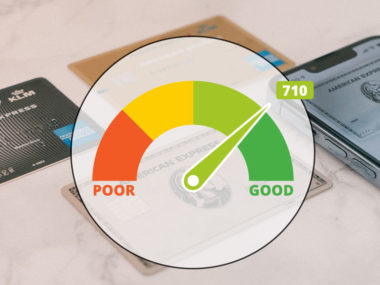When a potential lender, landlord, or employer decides whether you’re a worthy borrower, renter, or employee, they’ll usually review your credit history. This is an important element of the application process because it shows how you’ve dealt with debt in the past.
If you have a poor credit history or no credit history at all, lenders may be concerned with your ability to repay loans. A landlord may not feel comfortable renting a property to you and an employer may question your ability to responsibly handle money and finances.
Without a strong credit history on your credit report, you may lose out on these opportunities. In some cases, you may be provided with offers but they may not include optimal terms. You could be offered a loan for less than you need or a rental agreement that requires a larger security deposit. Your credit history is an important part of your credit report that directly affects your credit score.
Table of Contents
What Is Credit History?
Your credit history is a record of how you’ve repaid your debts in the past. It’s one component on your credit report, but it’s a big factor that also affects your credit score. Your credit history includes important information about:
- The accounts you’ve had throughout your life, both open and closed, such as credit cards and bank accounts.
- The current balance you owe on these accounts, or the debt you’re currently in.
- Your payment history and whether you’ve paid bills on time or at all.
Your credit history also defines these accounts as either installment or revolving credit accounts. Your revolving credit accounts are those that allow you to continue spending and can increase your debt at any time, such as credit cards. Installment credits are fixed loan amounts, such as a car loan or mortgage, that you make payments on to eventually absolve. Installment credits can’t grow over time and only shrink as you pay them off.
The payment history information provided on your credit history shows your habits as a bill payer. It also shows if you have any accounts in collections or if you’re delinquent on payments. For example, if you’ve been neglecting to pay credit card bills, it will show up on your payment history and negatively affect your credit history.
Credit History vs. Credit Report
While your credit history is a big part of your credit report, these terms don’t mean the same thing. Your credit report refers to the complete data file provided by the main three credit bureaus, Experian, Equifax, and TransUnion. In addition to your credit history, your credit report includes information such as:
- Your name.
- Your current address.
- Old addresses you have on file.
- Your current employer.
- Your past employers.
- Your credit score.
Your credit report includes all of these elements combined. Your credit history only includes information on your accounts, payment history, and whether there are any liens, judgments, or bankruptcies on your record.
How Does Credit History Work?
When a potential lender, employer, or landlord reviews your credit report, they’re not only looking at your current debts but also at how you behave as a consumer or borrower. By looking at your payment history and other elements recorded in your credit history, they can determine how responsible you might be going forward.
For example, say you applied for a mortgage for your first home. During the application process, the lender would examine your credit history. They would also look at your rental history and how many times you paid rent late. They may even look at your track record for paying utility bills on time — although, to be clear, utility bill payments do not affect your credit history unless a company takes you to collections and the collections agency reports your delinquency to the credit agencies.
If your credit history shows many late or skipped payments, the lender may not offer a mortgage. With poor credit history, the lender may provide a mortgage offer, but it will likely have a high interest rate and require a large down payment to protect the lender from a defaulted loan.
What if You Don’t Have a Credit History?
You may not have a credit history if you haven’t taken out loans or used credit credits yet. It’s common for college students that are just getting started to not have credit history. You don’t have an adequate record to prove you’re a responsible borrower if you don’t have a credit history.
With no credit history, lenders and landlords may not feel comfortable approving a person for a loan or to live on a property. If you don’t have credit history, don’t be surprised if you’re denied for loans or if a landlord asks for an extra security deposit or to add a co-signer to the lease.
Credit Score
Your credit score is a number representing your potential ability to repay a loan. To calculate your credit score, your credit history, current debts, and available credit are all taken into account. The credit score you have can determine whether you qualify for a loan and will affect the terms provided to you.
Your credit score is an important component included in your credit report, which is all your data from the credit bureau combined into one document. Your credit history is integral to this report and is a contributing factor to your credit score, but is not the score itself.
Why Credit History Matters
Not only does your credit history help agencies calculate your overall credit score, it’s also reviewed to determine your trustworthiness as a borrower. When you apply for a mortgage or to rent a property, your credit history is reviewed to determine how you’ve handled debt in the past. Credit card companies and financial institutions may also review your credit history before providing you with credit card or account offers.
How to Build Your Credit History
You can create positive credit history on your credit report by regularly making payments on time for a long time. Credit card and loan payments should be made in full on time to show you’re financially responsible and to increase your credit score.
To build your credit history, you’ll need to responsibly take on debt. Sign up for a credit card, make purchases, and make payments on time each month. You can also get a secured line of credit, which is credit that requires you to provide assets as collateral. By handling your debt responsibly, you can show you’re a reliable borrower who is able to manage finances.
While your credit history isn’t the only component that determines your credit score and shows up on your credit report, it’s an important one. Handle your debt responsibly and pay your bills on time to ensure you have adequate and positive credit history to show potential lenders.
Image Source https://depositphotos.com/





